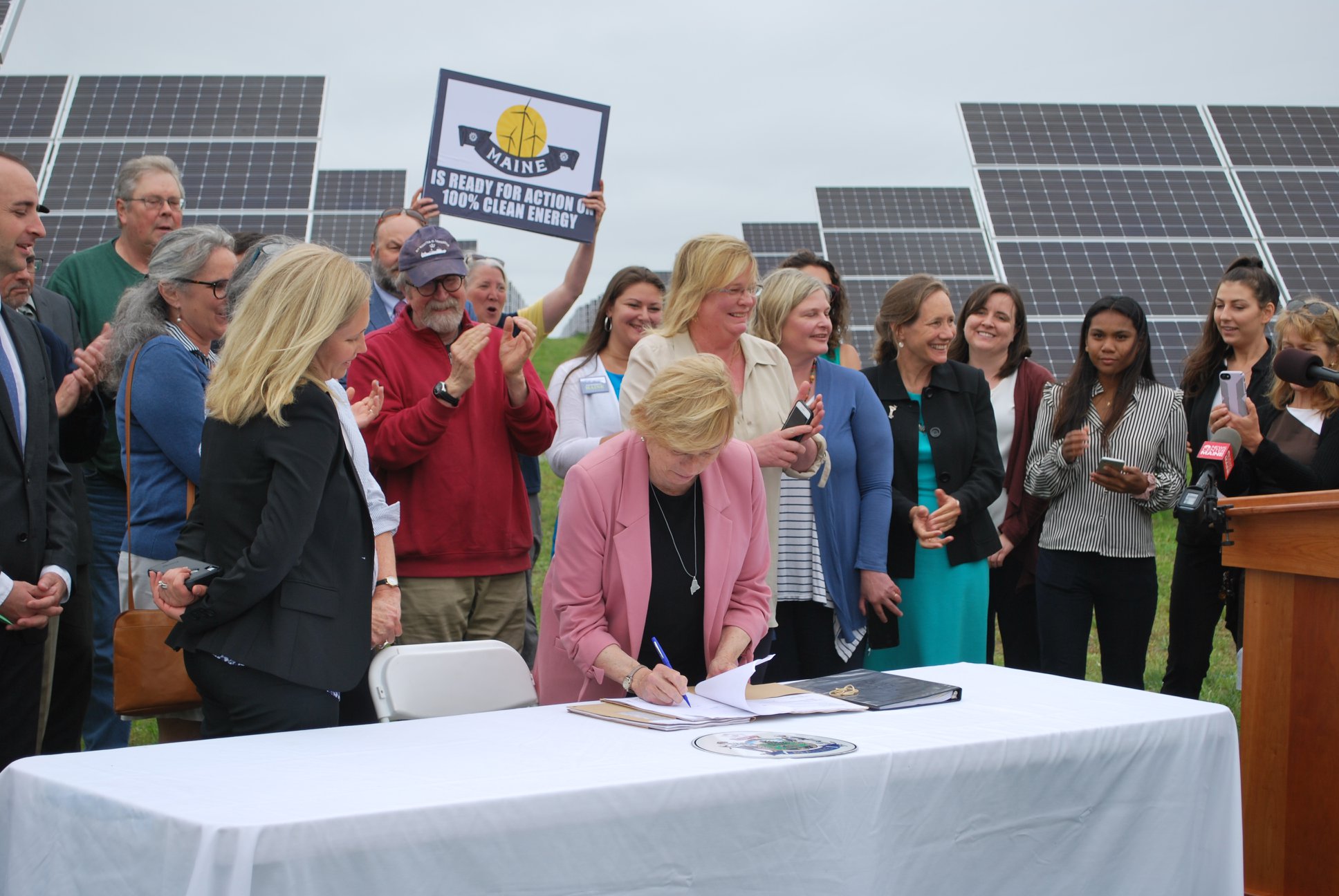Mainers are ready to protect our people and our planet -- and for the first time in years, our State House is aligning with communities to take bold action on climate.
The 129th Maine Legislature has been marked by landmark legislative wins. On June 26, first-term Governor Janet Mills signed three critical pieces of legislation that will move Maine away from fossil fuels and toward 100% clean, renewable electricity. After years of setbacks and defeats, the passage of policies like this one signals a new day for communities Down East.
In the weeks preceding the passage of these laws, Mainers from over 100 cities and towns joined the Sierra Club in calling on their legislators to pass these bills. Residents of York have been working toward a just and equitable transition to 100% renewable energy. Now, by aligning with municipal-level action for an all-renewable electricity sector, localities and the state can work together to provide clean, affordable power. Maine has joined California, Hawaii, New Mexico, New York, Nevada, Washington State, Washington, DC, Puerto Rico, and over 130 US cities by adopting a 100% clean energy goal.
Governor Mills stands with Sierra Club supporters at the legislation signing ceremony on June 26, 2019. Photo from Sue Levene
Thanks to Governor Mills and the state legislature, here’s what is now the law in Maine:
-
LD 1494, which increases the state’s Renewable Portfolio Standard (RPS) to 80% renewable energy by 2030 and 100% by 2050
-
LD 1679, which requires a statewide climate action plan to achieve net annual greenhouse gas emissions reductions by at least 80% by 2050 in addition to creating a Climate Council
-
LD 614, which incentivizes electric vehicles
-
LD 658, which aims to make Maine energy independent by 2030 by developing and expanding energy generating capacity, energy conservation, and energy efficiency
-
LD 994, which supports offshore wind exploration
-
LD 1282, which increases solar capacity of schools and focuses on a just transition to renewables through workforce development
-
LD 1711, which expands potential for solar across the state by increasing the number of customers for community solar farms
The historic 2019 legislative session for Maine highlights the need for strong leaders who prioritize the issues that affect everyday people, from lobster fishermen to solar installers.
And while we should celebrate these wins, the work is far from over. We need to push our leaders and go further to ensure that implementation first and foremost centers on the needs of Maine communities, especially low-income families and frontline communities, which are disproportionately affected by rate increases and higher energy burdens. We can’t claim victory until it’s clear no one is being left behind in the energy transition.
We can’t claim victory until it’s clear no one is being left behind in the energy transition.
There are many ways to make Maine’s clean energy transition more just: stipulating rate protection for low-income ratepayers; ensuring that renewable energy projects directly benefit Maine’s most-impacted communities first; removing sources of pollution that disproportionately affect marginalized and low-income communities; committing to supporting union jobs and a living wage for workers; and setting aside funding for job transition of fossil fuel workers. These are just a few of the actions we must take. This year’s bills do not include such promises, so future legislation will need to address the historic inequities that have long harmed frontline Maine communities.
As climate disruption makes itself felt in communities up and down the Maine coast -- and across the world -- we need everyone to be on board. We cannot afford to take half-measures in tackling the climate crisis. Polluted air and water, higher electricity costs, and inadequate protections for Maine workers would be more than policy failures; they would have real, tangible ramifications, especially for vulnerable communities that must be front and center in our fight.
The Sierra Club will continue to work for a just and equitable energy transition in Maine and beyond. For too long, the burning of dirty fuels like coal and gas has poisoned our air and water with toxic pollution, harmed the health of Maine families, and accelerated the climate disruption that threatens our own coastal communities with sea level rise and warmer waters. By building upon climate and clean energy solutions like the policies just passed, our state can address the climate crisis that’s already affecting our coastline, build strong local renewable economies, and support the health and well-being of all Mainers.
